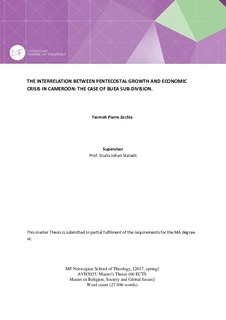The Interrelation Between Pentecostal Growth and Economic Crisis In Cameroon: the Case of Buea Sub-Division
Master thesis
Permanent lenke
http://hdl.handle.net/11250/2458499Utgivelsesdato
2017Metadata
Vis full innførselSamlinger
Sammendrag
This study examines the relationship between economic crisis and the growing popularity of Pentecostal churches in Buea municipality and its environs. The research question that was investigated was: what interrelationship can be found between the economic crisis and the growing popularity of the Pentecostal church in Cameroon since 1980. The study made uses of an in‐depth interview to examine the issue of Pentecostal growth in Buea. The researcher used a qualitative method to gather data (partly interviews and documents) and the theory of interconnection of globalisation and Pentecostal growth was used to guide the work. Religious belief is a common human characteristic with a greater proportion of the world population admitting to religious beliefs. Within Christianity, Pentecostal has experienced considerable growth in contrast with the more traditional churches. In another dimension, access to a decent standard of living is difficult to find in Cameroon despite having one of the most prosperous economies after independence. While religion is not the only answer to eradicating poverty or inequality, religion does provide important opportunities to enhance development outcomes. In the same vein, religious organisations and those motivated by religious beliefs have long been involved in working to improve the lives of the poor. Religion plays a vital role in people’s understanding and interpretation of who they are and why the world is structured the way it is. Pentecostalism has evolved as a peripheral movement to occupy a centre stage in several communities in Buea, where the movement has grown big and influential. The economy has been weakened by corruption, mismanagement and distrust. These churches have given people hopes through education, health, community development, prevention of crimes, voluntarism, women empowerment and spirituality, democratisation.
